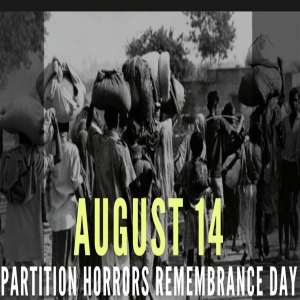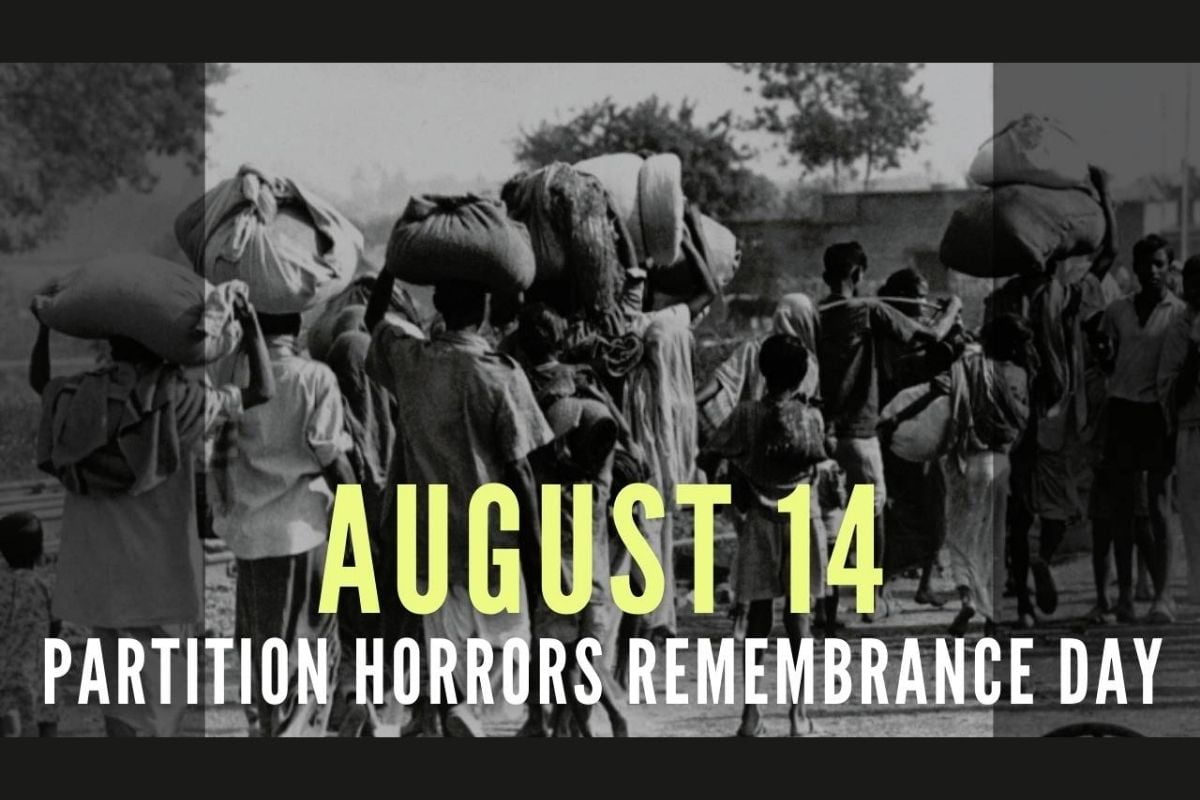
.png) Jacob Peenikaparambil
Jacob Peenikaparambil

Grabbing headlines by making strange and unusual declarations has been a gimmick adopted by the BJP government under PM Narendra Modi. People generally try to forget past events that have caused wounds and hurt feelings. The communal riots that accompanied the partition of India are a great wound in the body politics of India. By renewing that wound, the people of India will not gain anything; it could only ignite hate and enmity. But the BJP, which believes in dividing society based on religion, wants to reopen wounds to polarise the community. It was with this intention that on August 14, 2021, Prime Minister Narendra Modi declared that August 14 would be remembered as "Partition Horrors Remembrance Day" annually to remind the nation of the sufferings and sacrifices of Indians during the partition in 1947. The people of India could not be hoodwinked by "Partition Horrors Remembrance Day". The game plan failed miserably.
The BJP realised it had made a blunder by proclaiming from the rooftop that it would win 400 seats in the recently concluded Lok Sabha elections. Some of its leaders also said that 400 seats in the Lok Sabha were needed to change the Constitution of India. Hence, the opposition made protecting the Constitution of India and the rights of the SC, ST and Backward Castes a key election issue. The opposition, especially Congress and Rahul Gandhi, continues to hammer the BJP and PM Modi after the elections by raising the issue. Rattled by the Lok Sabha results, the BJP wants to embarrass the opposition, INDIA, especially the Congress, by raking up the issue of the Emergency declared by Indira Gandhi 50 years ago. It seems that the Modi-Shah duo did not learn any lessons from their previous experience.
It is a historical fact that in 1975, the Indira Gandhi government declared an Emergency in India, unveiling an era of State excesses, human rights violations, the centralisation of power and the dismantling of democracy. But she withdrew it and declared elections in which she was defeated. The Congress party acknowledged that the Emergency was a mistake made by Indira Gandhi and the party. Even Rahul Gandhi apologised for the excess during the Emergency on behalf of his party. Instead of learning lessons from past mistakes and introspecting on how democracy fared in the last ten years, the BJP under Modi and Shah is digging up the 50-year-old Emergency to camouflage their aberrations and well-thought-out violations.
The Union Government on July 12 declared that June 25 will be observed as Samvidhan Hatya Divas to pay tribute to all those who suffered and fought against the gross abuse of power during the period of Emergency. The gazette notification shared by Union Home Minister Amit Shah states, "Whereas, a proclamation of Emergency was made on June 25, 1975, following which there was gross abuse of power by government of the day and people of India were subjected to excesses and atrocities…. Therefore, Government of India declares June 25 as "Samvidhan Hatya Diwas" to pay tribute to all those who suffered and fought against the gross abuse of power during the period of Emergency and to recommit the people of India to not support in any manner such gross abuse of power, in future".
The opposition in the Lok Sabha, led by the Congress, described the government's declaration as "another headline-grabbing exercise in hypocrisy by the non-biological PM who had imposed an undeclared Emergency for ten long years before the people of India handed him a decisive personal and moral defeat on June 4, 2024—which will go down in history as ModiMukti Diwas."
Congress president Mallikarjun Kharge told Modi bluntly, "Your government has celebrated Constitution Murder Day every day." In his attack on the Modi government, Kharge mentioned how the Modi government, during the last ten years, murdered democracy. They include snatching away the self-respect of every poor and depriving a section of the population of the country of their livelihood, increasing crimes against Dalits and subjecting minorities to illegal bulldozer justice in which 1.5 lakh houses were demolished in just two years, and 7.3 lakh people were rendered homeless. He also said that the BJP-RSS never accepted the Indian Constitution. According to him, Mr Modi and RSS want to abolish the Constitution and implement Manusmriti so that the rights of Dalits, tribals and backward classes can be attacked.
The love of the BJP-RSS of the Indian Constitution appears to be hypocritical because of three reasons. First of all, RSS, the ideological parent of the BJP, was against the present Indian Constitution when it was adopted by the Constituent Assembly. An editorial in the Organiser (RSS mouthpiece) criticised it in no uncertain terms and praised Manusmriti: "The worst [thing] about the new Constitution of Bharat, is that there is nothing Bharatiya about it… [T]here is no trace of ancient Bharatiya constitutional laws, institutions, nomenclature and phraseology in it … no mention of the unique constitutional developments in ancient Bharat. Manu's laws were written long before Lycurgus of Sparta or Solon of Persia. To this day his laws as enunciated in the Manusmriti excite the admiration of the world and elicit spontaneous obedience and conformity [among Hindus in India]. But to our constitutional pundits that means nothing". (Excerpts from an Editorial on Constitution, Organiser, November 30, 1949).
Moreover, Hindutva ideologue Vinayak Damodar Savarkar lambasted the draft of the Constitution and emphasised that Manusmriti should have been made the basis of Indian Laws. "Manusmriti is that scripture which is most worship-able after Vedas for our Hindu Nation and which from ancient times has become the basis of our culture-customs, thought and practice. This book for centuries has codified the spiritual and divine march of our nation. Even today the rules which are followed by crores of Hindus in their lives and practice are based on Manusmriti. Today Manusmriti is Hindu Law. That is fundamental." (VD Savarkar, 'Women in Manusmriti').
Manu Smriti envisages a caste-based hierarchical and patriarchal society in which the low castes and women have no rights and status. Though the Manusmriti lauded women as bearers and rearers of children, they were considered subordinate to men in all respects. They had no access to education or, indeed, any activity outside their houses. Thus, the Manusmriti is diametrically opposed to the core values and principles of the Indian Constitution-justice, equality, liberty, fraternity and individual dignity.
Devanur Mahadeva, in his book, "RSS Aala Agala" (RSS-The Depth and Breadth), writes that the RSS, on January 1, 1993, published a white paper that denounced the Constitution of India and called it "anti-Hindu." Their rejection is on the grounds that the Indian Constitution is foreign-oriented and has to be discarded entirely. It also disagrees with the Constitution because it favours federalism. The RSS, on the contrary, likes to see India as a totalitarian state where states may have symbolic purposes. The efforts of the BJP government during the last ten years to reduce or usurp the powers of the states are to be viewed from the perspective of its goal of converting the governance of India into a unitary form of government. However, the Supreme Court's judgements have made clear that federalism is part of the "basic structure" of the Indian Constitution.
Not only was the RSS against the present Indian Constitution, but its political wing, the BJP, while in power, made an attempt to rewrite it. The government led by Atal Bihari Vajpayee had appointed a commission to review the Constitution in 1998-1999. The Venkatachalaiah Commission submitted its report to the Vajpayee government with its recommendations, but in 2004, Vajpayee lost the election, and the whole idea of reviewing the Constitution was dropped.
Secondly, some BJP leaders like Anant Kumar Hegde of Karnataka and Lallu Singh, the BJP candidate who was defeated in Faizabad Lok Sabha constituency, had said publicly that the BJP and its allies wanted to win 400 seats to change the Constitution of India. During the electioneering, Ayodhya's sitting BJP MP Lallu Singh said at a public meeting in Milkipur assembly constituency that the government would need a two-thirds majority in Parliament to "make a new Constitution."
Thirdly, the provisions and the spirit of the Indian Constitution were blatantly violated during the last ten years in such a way that many political observers and analysts have termed the period of the Modi government an era of "undeclared emergency". There were too many aberrations or violations to be counted.
All democratic institutions, such as the Parliament, the Judiciary, the Election Commission, etc., were so undermined that their revival has become a herculean task. The Parliament became a rubber stamp as many laws were passed without sufficient or even without any discussions. For example, the three crucial bills: the Bharatiya Nyaya Sanhita to replace the Indian Penal Code, 1860; the Bharatiya Sakshya Adhiniyam to replace the Indian Evidence Act; and the Bharatiya Nagarik Suraksha Sanhita to replace Criminal Procedure Code, 1973 were passed by the Lok Sabha when 93 opposition MPs were suspended.
The judiciary is the bulwark of a democracy. However, the response of the judiciary, especially the verdict of the Supreme Court, in many cases in which the Central Government was a stakeholder, appeared to favour the government. The verdict in the Electoral Bonds case was an exception. The Supreme Court has yet to decide on the constitutional validity of the Citizenship Amendment Act (CAA), which many legal luminaries consider anti-constitutional.
Regarding the protection of the rights of the citizens from the onslaught of the state, the Supreme Court has often been hesitant to take a stand in favour of the falsely accused citizens. Rampant violation of the democratic rights of the citizens to protest, dissent and criticise the government is another proof of an undeclared Emergency. Those who protest against the government are branded as anti-nationals, terrorists or urban Naxalites. There has been an unprecedented increase in the number of citizens arrested under draconian laws like UAPA, National Security Act (NSA) and Sedition Law since 2014. Many of them are booked because of their criticism of the government.
Another characteristic of an undeclared emergency is that central agencies target opposition leaders. If Indira Gandhi imprisoned opposition leaders during the Emergency, the Modi government used central agencies like the National Investigation Agency (NIA), Central Bureau of Investigation (CBI), Enforcement Directorate (ED), and Income Tax Department to harass and raid opposition leaders. The arrest and incarceration of the chief ministers of Delhi and Jharkhand, Arvind Kejriwal and Hemant Soren, are examples.
Another significant sign of an "undeclared Emergency" is the media's slavery. Except for a few news channels and newspapers that can be counted on fingers, the whole media has become slavish to the government, mainly because a large section of the media is under the control of corporate leaders who support the government. The government also uses a carrot-and-stick policy to subjugate the media by arresting journalists who are critical of the government and providing incentives in the form of advertisements to those who support the government.
Political activist Yogendra Yadav once described the situation under PM Modi as 'democracy capture.' According to him, Modi and Amit Shah are using democracy to subvert democracy. The formal procedures of democracy have been used to subvert the substance of democracy. In other words, the external form of democracy is preserved, but the soul of democracy is being killed through brutal suppression of dissent, protests and criticism, and emasculation of democratic institutions which function as watchdogs. That is why the political scenario in India under PM Modi is characterised as a period of "undeclared Emergency."
Even after the drubbing the BJP got in the Lok Sabha elections, its anti-constitutional approach has not changed. The declaration that June 25 will be observed as "Constitution of Murder Day" is another gimmick to hide the anti-constitutional policies and actions of the BJP government under Narendra Modi and Amit Shah.